The Ultimate Guide to Gen Z Relationship Terms
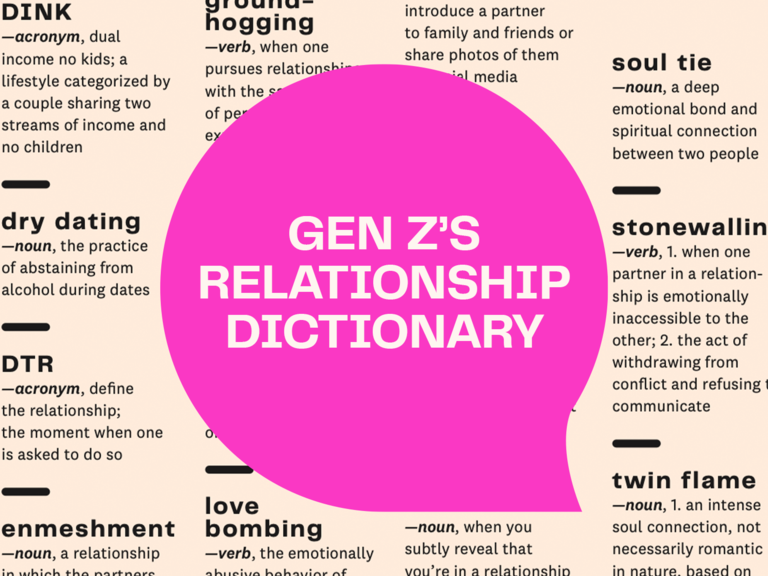

I'm a millennial. I grew up wearing butterfly clips, bell bottom jeans and graphic tees. I had a Tamagotchi, a see-through phone and a bright purple inflatable couch. So yes, I need to do research to keep up with Gen Z relationship terms and Gen Z slang.
Do you also hate TFW you have no clue what people are talking about? Consider this your official guide to the top Gen Z dating terms from A to Z.
The Gen Z Dating Dictionary
After learning these definitions, you'll be able to decode the latest Gen Z lingo and confidently join any convo.
Affordating
verb—going on affordable dates
BAE
acronym—before anyone else
Beige Flag
noun—1. unoriginal or dull dating app prompt responses, photos and/or conversation starters; 2. a partner's unique quirks and innocuous habits
Someone's dating app "beige flag"could be that they answer the dating prompt, "The best way to get to know me," with "Just ask." The answer is overused and isn't a good conversation starter. A partner's "beige flag" could be that they never press "stop" on their alarm so it goes off every nine minutes.
Benching
verb—when someone casually dates a partner without committing, essentially keeping them as an "option"
Breadcrumbing
verb—providing a partner with just enough affection to maintain their attention while never progressing the relationship
Breadcrumbing is new Gen Z lingo, but being led on is nothing novel. A lot of people have experienced the lack of communication, canceled plans and mixed signals.
Catch Feels
verb—starting to develop romantic feelings for someone
Cuffing Season
noun—the time of year when people are more likely to seek a relationship, typically during the colder months
When the temperatures drop, cuffing season starts. Instead of hibernating alone, people pair up to, well, weather out the weather together.
Cushioning
verb—when someone flirts with other people and "keeps their options open" even though they're in a committed relationship
Delusionship
noun—an imagined or idealized relationship that isn't based in reality
If someone fantasizes about a future with someone they haven't met, interact with sporadically or who isn't as invested in the relationship, it might be a delusionship.
DINK
acronym—dual income no kids; a lifestyle that some couples seek categorized by two income streams and no children
While the concept isn't new, the term trended on TikTok when people shared videos about their "DINK era." Some plan to have kids in the future, and others never want kids.
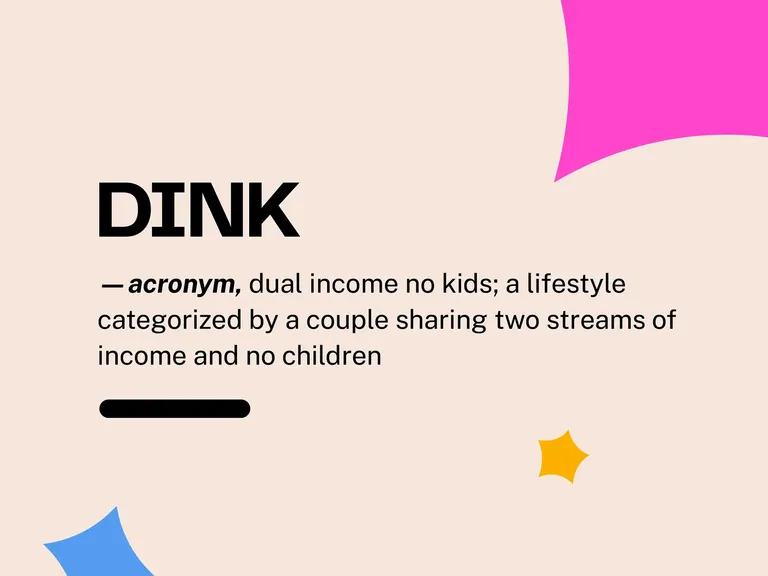
Dry Dating
noun—the practice of abstaining from alcohol during dates
Gen Z daters are leading the dry dating trend in an effort to be present and engaged on dates, whether it's the first date or the fiftieth.
DTR
acronym—define the relationship
The DTR conversation helps people get on the same page about their relationship status. It often starts with, "What are we?"
Enmeshment
noun—a relationship in which the partners and their lives have become so intertwined, boundaries are ignored or blurred
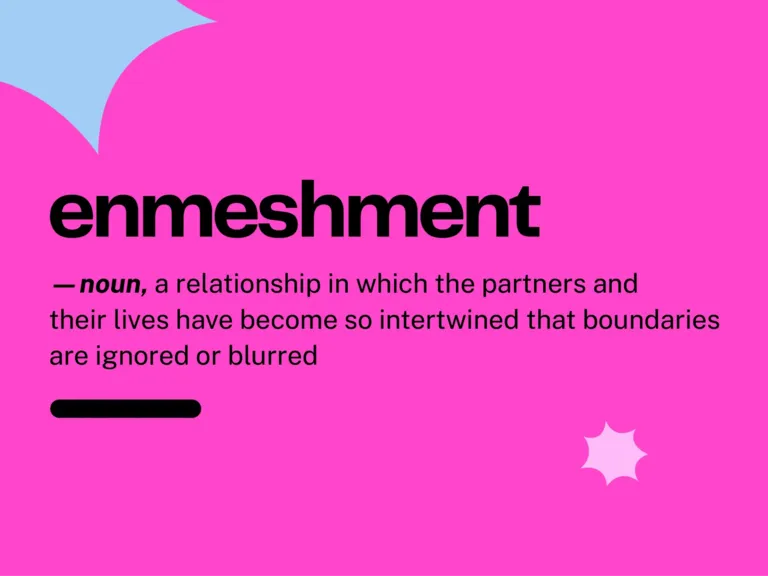
Fexting
verb—to fight with a partner over text message, reportedly coined by former first lady Dr. Jill Biden
Freak Matching
verb—when a dater looks for a partner with shared quicks and interests, coined by Plenty of Fish
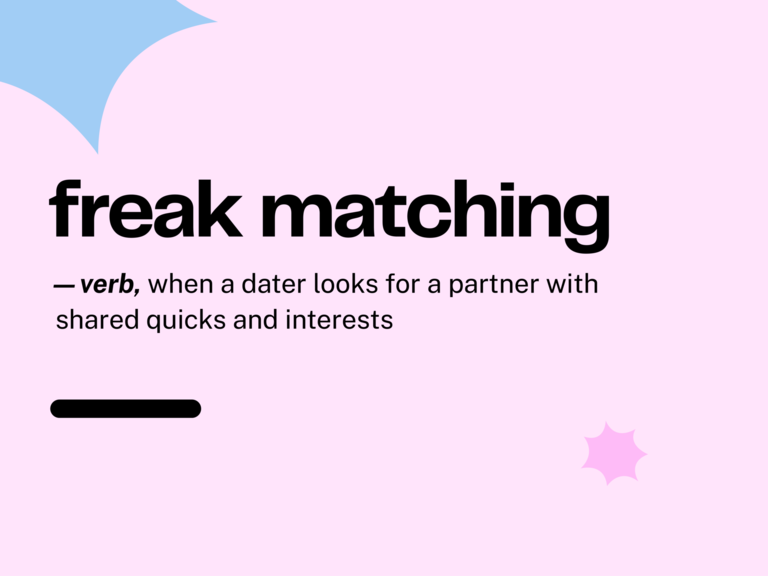
Freckling
verb—the act of entering into a more serious relationship during the warmer summer months, before ending the relationship during the fall or winter season
Future-Proofing
verb—when a dater asks important questions early in the dating process to determine long-term compatibility, coined by Bumble
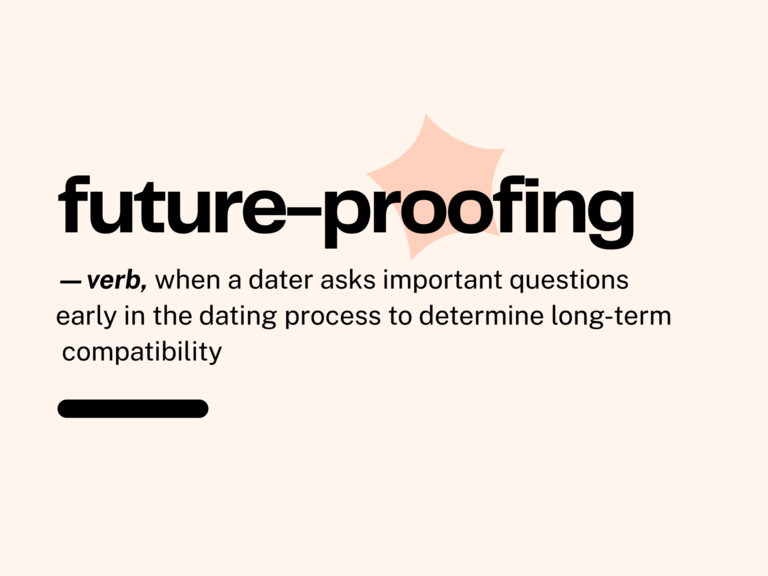
Ghosting
verb—when someone suddenly stops communicating without explaining it
Ghosting is essentially a Gen Z term for "ignore." In a dating scenario, it could mean the person stops responding instead of explaining that they aren't interested.
Groundhogging
verb—when someone repeatedly pursues relationships with the same type of person but expects different results
Hardballing
verb—when a dater shares their expectations before a first date
Ick
noun—an immediate "turn off" toward someone, often for something superficial
You may have heard people say they have "the ick" for anything from seeing their crush wear socks with sandals to clapping when the plane lands.
ILY
acronym—I love you, essentially Gen Z slang for "love"
Intentional Dating
verb—when a dater knows their relationship values and goals and only dates people who are likely to be compatible
Some people create "love lists" and relationship vision boards to "manifest" their ideal partner and relationship. These intentional dating strategies can help them find a long-term partner.
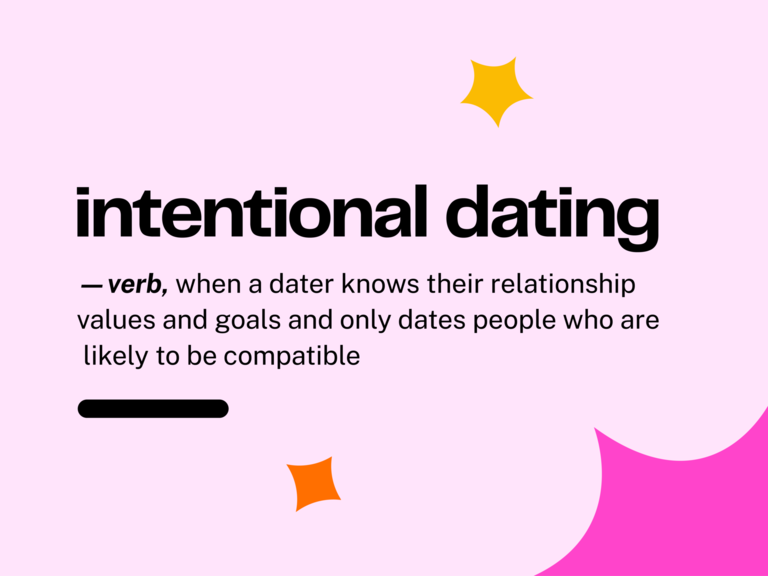
Kittenfishing
verb—when someone misrepresents themselves on dating apps with smaller lies than the more overt catfishing
Who hasn't been on a date with someone who said they were 6 '2 but really they are 5' 9 or someone who clearly used photos from a decade ago? If that sounds all too familiar, you could say you were kittenfished.
Loud-Looking
verb—when people share their dating or relationship goals on their dating app profile, coined by Tinder
Love Bombing
verb—the unhealthy and potentially abusive behavior of showering excessive flattery and/or gifts for the purpose of manipulation
Some examples of love bombing are giving expensive gifts, texting or calling frequently, wanting to be together constantly and saying things like "I love you" or "You're my soulmate" early in the relationship. If it feels "too good to be true" or seems like things are moving too fast, it could be love bombing.
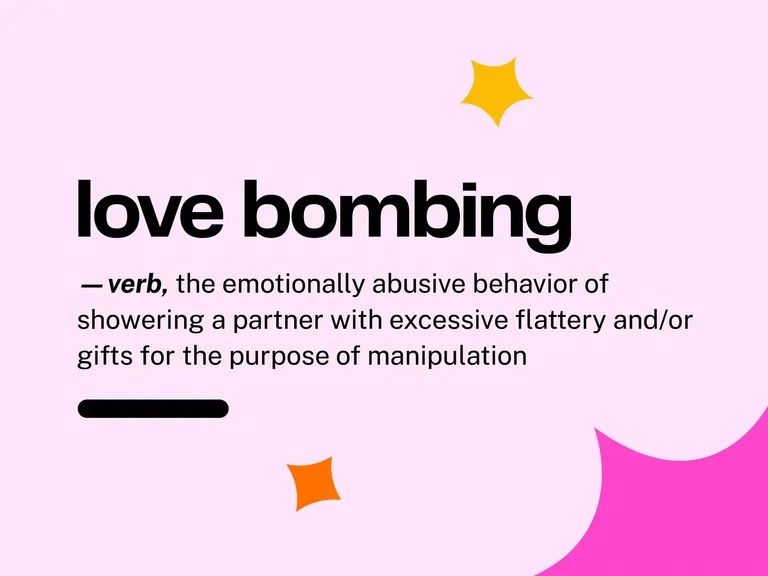
Micro-mance
noun—small romantic gestures, coined by Bumble
Orbiting
verb—when an ex stops communicating IRL, but continues interacting on social
Pocketing
verb—a verbal or nonverbal refusal to introduce a partner to family and friends or share photos on social media
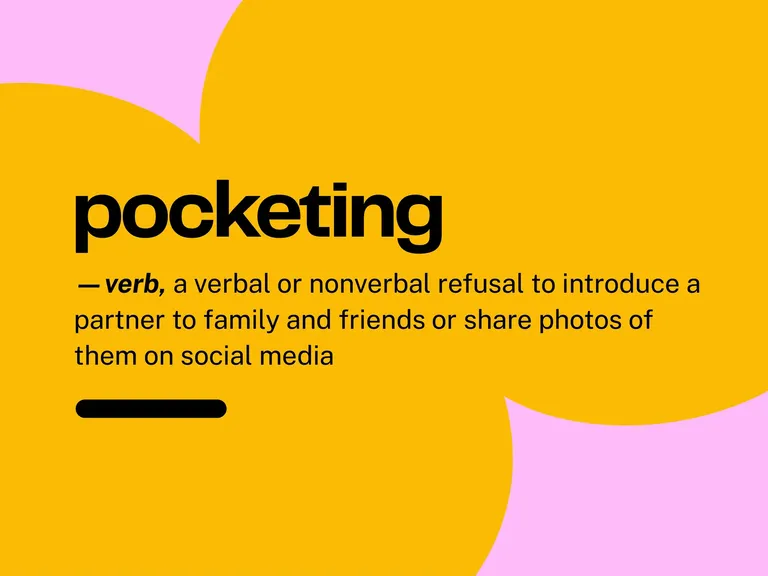
Rizz
noun—the ability to attract people by being charismatic
FYI: Rizz is short for charisma. Like many Gen Z terms, it gained popularity on TikTok.
Roommate Syndrome
noun—when a romantic relationship begins to feel platonic once a couple moves in together
Some tell-tale signs of roommate syndrome are less physical and emotional intimacy, fewer dates and spending more time apart.
Ship
verb—being in favor of a relationship between two people
Situationship
noun—a romantic or sexual relationship that remains undefined
If there's a lack of communication, clarity and commitment, the "relationship" might be a situationship.
Sneaky Link
noun—a secret lover
Slow Fade
noun—when someone ends a relationship or situationship by slowly decreasing communication, instead of having an honest conversation
Soft Launch
noun—the subtle reveal that you're in a relationship by sharing slightly obscured photos of your partner on social media
A soft launch suggests someone is in a relationship, like a close-up of two people holding hands. The hard launch reveals who the person is dating, making it "Instagram official."
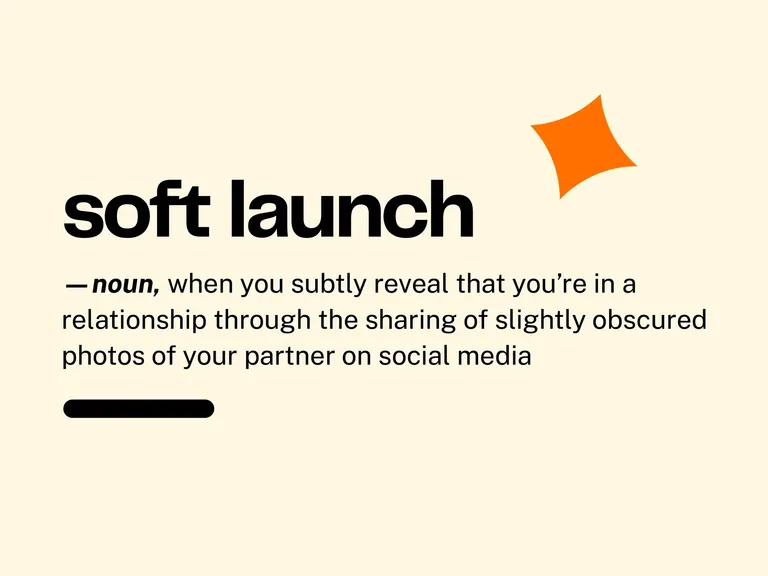
Soul Tie
noun—a deep emotional and spiritual bond between two people
Stonewalling
verb—when someone in a relationship responds to conflict by becoming emotionally and/or physically distant
Some signs of stonewalling are avoiding eye contact, using the silent treatment, walking away from a conversation and dismissing their partner's feelings.
Talking Stage
noun—the early stages of dating before defining the relationship
Twin Flame
noun—1. an intense soul connection, not necessarily romantic in nature, based on the concept of one soul being split into two bodies; 2. a type of soul tie
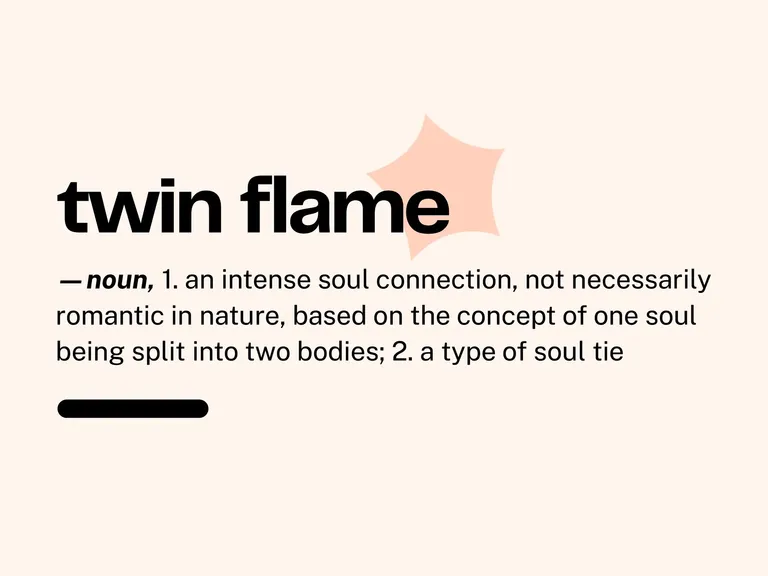
Yap-Trapping
verb—when a dater only talks about themselves on a date and doesn't try to get to know the other person, coined by Plenty of Fish
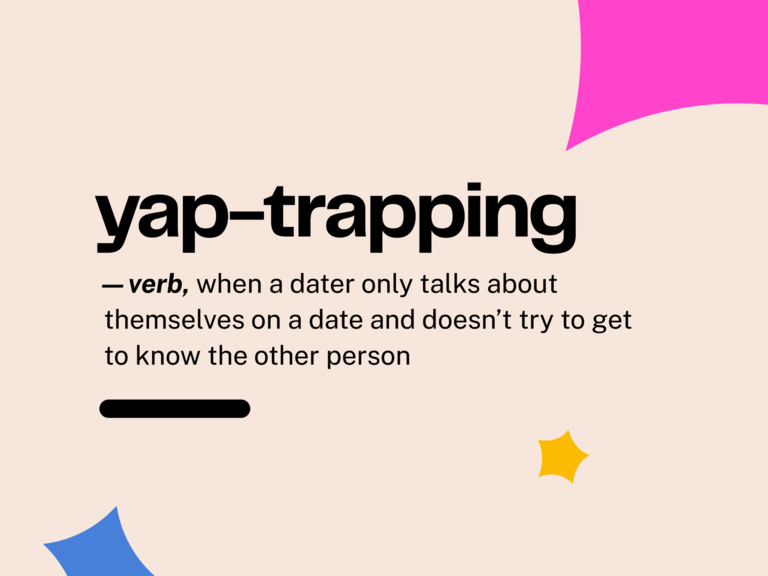
Zombieing
verb—when a dater "ghosts" someone and then reaches out again, often without acknowledging that they "ghosted"

Additional reporting by Jamie Cuccinelli.






















